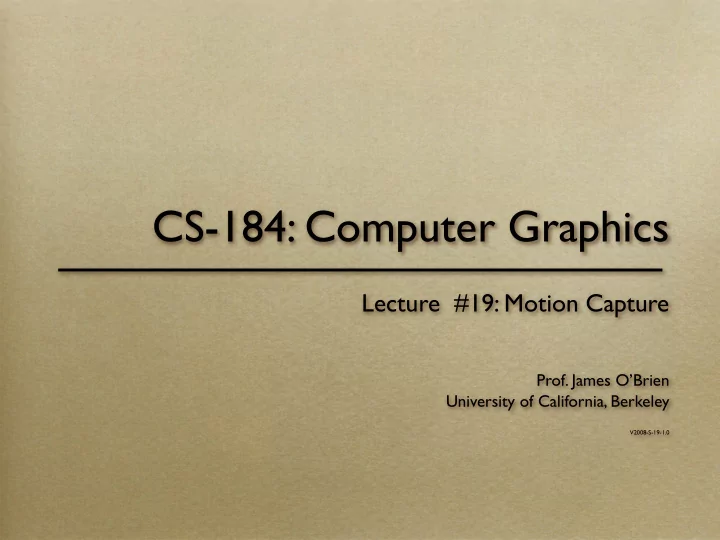

CS-184: Computer Graphics Lecture #19: Motion Capture Prof. James O’Brien University of California, Berkeley V2008-S-19-1.0
Today Motion Capture 2
Motion Capture Record motion from physical objects Use motion to animate virtual objects Simplified Pipeline: Setup and calibrate equipment Record performance Process motion data Generate animation 3
Basic Pipeline Record Setup Animation Process From Rose, et al., 1998 4
What types of objects? Human, whole body Portions of body Facial animation Animals Puppets Other objects 5
Capture Equipment Passive Optical Reflective markers IR (typically) illumination Special cameras Fast, high res., filters Triangulate for positions 6 Images from Motion Analysis
Capture Equipment Passive Optical Advantages Accurate May use many markers No cables High frequency Disadvantages Requires lots of processing Expensive systems Occlusions Marker swap Lighting / camera limitations 7
Capture Equipment Active Optical Similar to passive but uses LEDs Blink IDs, no marker swap Number of markers trades off w/ frame rate Phoenix Technology Phase Space 8
Capture Equipment Magnetic Trackers Transmitter emits field Trackers sense field Trackers report position and orientation May be wireless Control 9
Capture Equipment Electromagnetic Advantages 6 DOF data No occlusions Less post processing Cheaper than optical Disadvantages Cables Problems with metal objects Low(er) frequency Limited range Limited number of trackers 10
Capture Equipment Electromechanical Analogus 11
Capture Equipment Puppets Digital Image Design 12
Performance Capture Many studios regard Motion Capture as evil Synonymous with low quality motion No directive / creative control Cheap Performance Capture is different Use mocap device as an expressive input device Similar to digital music and MIDI keyboards 13
Manipulating Motion Data Basic tasks Adjusting Blending Transitioning Retargeting Building graphs 14
Nature of Motion Data Witkin and Popovic, 1995 Subset of motion curves from captured walking motion. 15
Adjusting IK on single frames will not work Gleicher, SIGGRAPH 98 16
Adjusting Define desired motion function in parts Adjustment Inital sampled data Result after adjustment 17
Adjusting Select adjustment function from “some nice space” Example C2 B-splines Spread modification over reasonable period of time User selects support radius 18
Adjusting IK uses control points of the B-spline now Example: position racket fix right foot fix left toes balance 19 Witkin and Popovic SIGGRAPH 95
Adjusting Witkin and Popovic SIGGRAPH 95 What if adjustment periods overlap? 20
Blending Given two motions make a motion that combines qualities of both Assume same DOFs Assume same parameter mappings 21
Blending Consider blending slow-walk and fast-walk Bruderlin and Williams, SIGGRAPH 95 22
Blending Define timewarp functions to align features in motion Normalized time is w 23
Blending Blend in normalized time Blend playback rate 24
Blending Blending may still break features in original motions Touchdown for Run Touchdown for Walk Blend misses ground and floats 25
Blending Add explicit constrains to key points Enforce with IK over time Touchdown for Run Touchdown for Walk 26
Blending / Adjustment Short edits will tend to look acceptable Longer ones will often exhibit problems Optimize to improve blends / adjustments Add quality metric on adjustment Minimize accelerations / torques Explicit smoothness constraints Other criteria... 27
Multivariate Blending Extend blending to multivariate interpolation "Speed" “Speed” “Happiness” 28
Multivariate Blending Extend blending to multivariate interpolation "Speed" If we have other examples “Speed” place them in the space also “Happiness” Use standard scattered-data interpolation methods 29
Transitions Transition from one motion to another Perform blend in overlap region 30
Cyclification Special case of transitioning Both motions are the same Need to modify beginning and end of a motion simultaneously 31
Transition Graphs Flip Run Sit Walk Trip Stand Dance 32
Motion Graphs Hand build motion graphs often used in games Significant amount of work required Limited transitions by design Motion graphs can also be built automatically Flip Run Sit Walk Trip Stand Dance 33
Motion Graphs Similarity metric Measurement of how similar two frames of motion are Based on joint angles or point positions Must include some measure of velocity Ideally independent of capture setup and skeleton Capture a “large” database of motions 34
Motion Graphs Compute similarity metric between all pairs of frames Maybe expensive Preprocessing step There may be too many good edges Walking , frame i Running, frame j Clustering 35 Arikan and Forsyth, 2002
Motion Graphs Random walks Start in some part of the graph and randomly make transitions Avoid dead ends Domain of smoothing Useful for “idling” behaviors Transitions Use blending algorithm we discussed Smoothed Signal 36
Motion graphs Match imposed requirements Start at a particular location End at a particular location Pass through particular pose Can be solved using dynamic programing Efficiency issues may require approximate solution Notion of “goodness” of a solution 37
Suggested Reading Fourier principles for emotion-based human figure animation, Unuma, Anjyo, and Takeuchi, SIGGRAPH 95 Motion signal processing, Bruderlin and Williams, SIGGRAPH 95 Motion warping, Witkin and Popovic, SIGGRAPH 95 Efficient generation of motion transitions using spacetime constrains, Rose et al., SIGGRAPH 96 Retargeting motion to new characters, Gleicher, SIGGRAPH 98 Verbs and adverbs: Multidimensional motion interpolation, Rose, Cohen, and Bodenheimer, IEEE: Computer Graphics and Applications, v. 18, no. 5, 1998 38
Suggested Reading Retargeting motion to new characters, Gleicher , SIGGRAPH 98 Footskate Cleanup for Motion Capture Editing, Kovar , Schreiner, and Gleicher, SCA 2002. Interactive Motion Generation from Examples, Arikan and Forsyth, SIGGRAPH 2002. Motion Synthesis from Annotations, Arikan, Forsyth, and O'Brien, SIGGRAPH 2003. Pushing People Around, Arikan, Forsyth, and O'Brien, unpublished. Automatic Joint Parameter Estimation from Magnetic Motion Capture Data, O'Brien, Bodenheimer, Brostow, and Hodgins, GI 2000. Skeletal Parameter Estimation from Optical Motion Capture Data, Kirk, O'Brien, and Forsyth, CVPR 2005. Perception of Human Motion with Different Geometric Models, Hodgins, O'Brien, and Tumblin, IEEE: TVCG 1998. 39
Recommend
More recommend